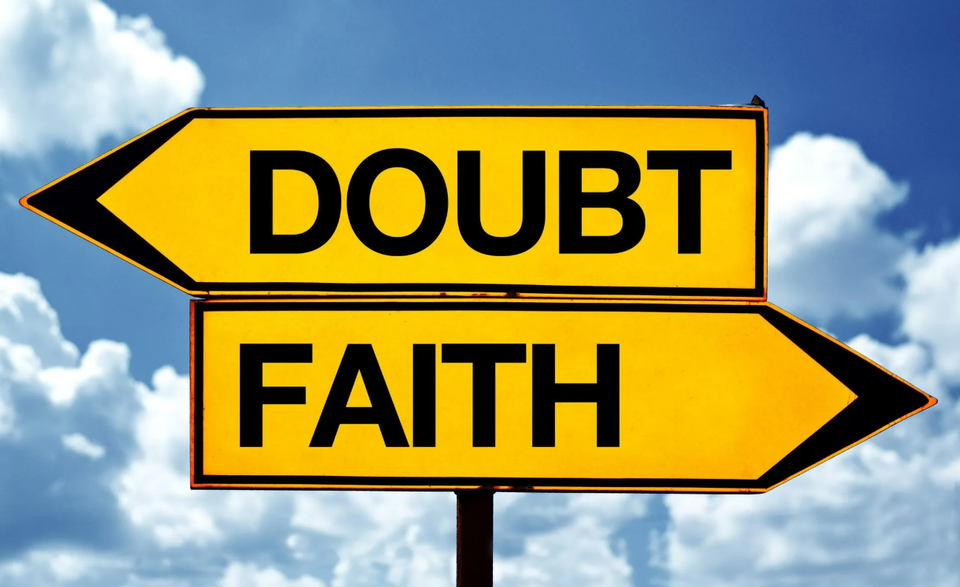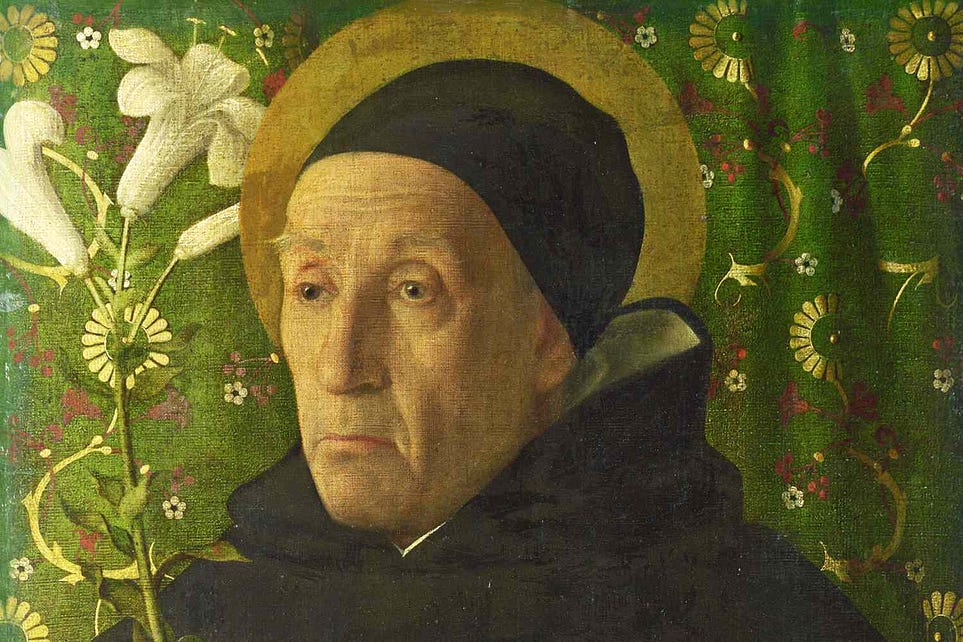Doubt, Certitude, and Unknowing: Three Ways of Meeting God

In much of modern mainline/liberal Christianity, doubt has become almost sacramental. It is spoken of as the honest core of faith — a refusal to claim what one cannot yet see. Many today equate belief not with knowledge, but with courage in uncertainty. “I believe; help my unbelief” has become the creed of the modern soul.
And yet, in Islam, the highest stage of faith is not doubt, but yaqīn — certitude. The Qur’an does not present yaqīn as stubbornness or pride but as vision: the kind of knowing that arises when the veil lifts and the heart perceives reality directly.
Having lived in both of these worlds — the striving and yearning faith of “unknowing” and the luminous assurance of Islamic yaqīn — I have come to see that doubt, unknowing, and certitude are not opposed. They are stages of the same spiritual journey. To put it, in a sense: doubt purifies, unknowing sanctifies, and certitude illumines. (This is the same “purification, sanctification, illumination” pattern that we see time and time again — within Catholicism as well as Orthodoxy — and even faiths outside of Christianity.)
The Honesty of Doubt
In the Christian tradition, doubt often carries a strange dignity. It is born of the moral conscience that refuses to lie about one’s perception of God or reality. Sometimes it arises from a certain ‘woundedness’ — prayers seemingly unanswered, a God that is silent, corruption in the Church, or the shock of living in a world that no longer seems ‘enchanted’.
At its best, this kind of doubt is not rebellion against God. Rather, it is a sincere yearning. It is the cry of one who refuses to settle for sentimentality on the one hand, and boxed-in dogma on the other. It is Jacob wrestling the angel through the night. I have always truly admired that kind of honesty.
But I have also seen how doubt can become a home one was never meant to stay in. The soul that clings to its questioning out of fear of being deceived eventually forgets how to be astonished. It can no longer risk trust. When the wound becomes an identity, the heart begins to worship the question itself.
As a Christian, I would sometimes ask… Did Christ come to give us… doubt?
I never really felt that myself, but I began to wonder this surveying the Christian landscape.
The Peace of Certitude
Islam offers another vocabulary for knowing God — one that feels almost alien to the modern religious psyche. Yaqīn, or certitude, is not the pride of “having all the answers,” but the tranquility that comes when the heart becomes a mirror to the Real.
The Qur’an speaks of three ascending degrees of certainty: ʿilm al-yaqīn (the knowledge of certainty), ʿayn al-yaqīn (the eye of certainty), and ḥaqq al-yaqīn (the truth of certainty). These are not dogmatic assertions but stages of unveiling (kashf).
Al-Ghazālī, after dismantling every intellectual foundation of his own faith, came to say that true knowledge is born only when God casts a light into the heart. That light is yaqīn: not argument, but vision. It is not the mind that grasps God, but the heart that becomes still enough to receive Him.
In that sense, yaqīn is not the end of all inquiry, but its true fulfillment. The seeker who attains it does not stop asking — he simply asks from within the Presence of God — not outside it.
The Mystery of Unknowing
Between doubt and certitude lies a third and rarer station: unknowing.
The Sufis call it ḥayra — bewilderment. Ibn ʿArabī wrote that the gnostic (ʿārif) is perpetually bewildered, for every unveiling reveals a deeper mystery. To know God is not to comprehend Him, but to be overwhelmed by His infinity.
This ḥayra is not confusion, but rather it is the awe within Divine Silence— the hush that remains when the veil is lifted. The Qur’an alludes to it when it says, “They encompass nothing of His knowledge except what He wills.”
The Christian mystic Meister Eckhart (who was a major figure in my coming to Islam) called this docta ignorantia, “learned ignorance” — the knowledge that arises when the intellect bows before the mystery of the divine. In his sermons, he said that the soul must become “unknowing,” emptied even of its concepts of God, if it is to receive God as He is.
Unknowing, then, is not a lack but an excess. It is what happens when the light of yaqīn becomes too bright for thought to contain. It is the humility of one who sees the majesty of the Real and falls silent.
Between the Question and the Silence
To remain forever in doubt is to linger in the night, afraid to move toward morning. Yet to grasp at certitude too soon is to mistake the first glimmer for the full day. The soul needs both darkness and quiet — the testing of doubt and the humility of unknowing — before it can receive the light without distortion.
At its best, Christianity understands the longing that lives inside our questions. Islam understands the peace that comes when those questions are answered by the Real. Both have their wisdom — the ache and the repose — and the seeker must learn from each before he can truly rest.
The ḥakīm — the sage — neither despises doubt nor fears certainty. He knows that doubt humbles the mind, unknowing humbles the heart, and certitude humbles the entire self.
The Gentle Road
When I look back on my own path, I can see that each stage had its mercy:
- Doubt stripped away illusion and pride.
- Unknowing opened me to awe.
- Certitude restored me to peace.
I can see clear patterns of this in my own history.
But certitude, as Islam understands it, is not personal confidence — it is tawḥīd, the recognition that there is no reality but God. It is the heart’s surrender to the order that already is. Doubt and unknowing both have their place, but they are only stations on the way to what the Qur’an calls al-ḥaqq al-yaqīn — “the truth of certainty.”
Orthodox Islam does not demand the death of thought. Rather, it disciplines it. It does not glorify confusion, nor does it mistake certitude for arrogance. It teaches that the mind’s questions and the heart’s silences must both end in islām — in submission to the One who reveals Himself through both reason and revelation.
In this light, the restless search of the modern soul finds its answer not in endless questioning, but in the serenity of divine order. To live with yaqīn is to stand where the prophets stood: seeing the world as a sign, the heart as a mirror, and God as the only Real.
For the believer, this is not dogma but liberation — the freedom that comes when all lesser certainties fall away.
As the Qur’an says, “Does not the heart find rest in the remembrance of God?”
And yet, even here, the mystery is not exhausted. Meister Eckhart once said that the soul must “go out of its knowledge into unknowing,” for only there does it truly encounter God. Islam agrees — but adds that such unknowing is not the loss of truth, it is its consummation. When the self dissolves before the Majesty of the Real, what remains is not confusion, but the peace of tawḥīd.
In that silence, Eckhart’s unknowing and the Muslim’s yaqīn finally meet — not as rivals, but as two ways of bowing before the same Light.

If you like this content, please consider a small donation via PayPal or Venmo. I am currently studying Islam and the Arabic language, and any donation — however small! — will greatly help me to continue my studies, my work, and my sustenance. Please feel free to reach me at saidheagy@gmail.com.
Thank you, and may God reward you! Glory to God for all things!